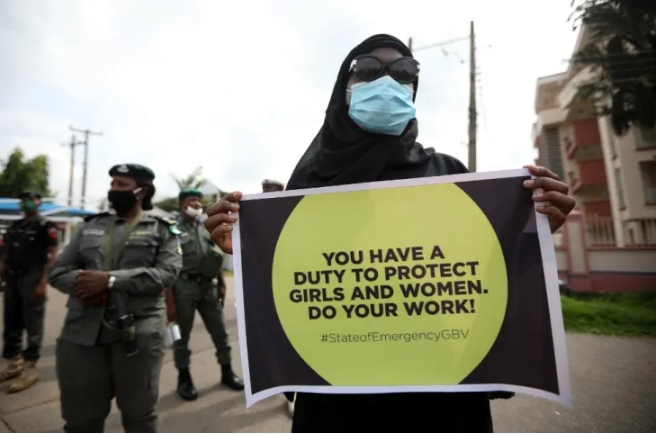EXCITING NEWS: TNG WhatsApp Channel is LIVE…
Subscribe for FREE to get LIVE NEWS UPDATE. Click here to subscribe!
Gender-based violence (GBV) encompasses a wide spectrum of repugnant human rights violations, encompassing sexual violence, physical violence, emotional and psychological violence, child marriage, femicide, trafficking, female genital mutilation (FGM), domestic violence, and rape.
In Nigeria, femicide, which is the intentional killing of women or girls due to their gender, has risen significantly, causing alarm and demanding urgent action.
TheNewsGuru.com (TNG) reports that this surge became more pronounced during the COVID-19 lockdown in 2020 as Africa continues to grapple with high rates of women and girls being killed by intimate partners or family members.
According to the United Nations Office on Drugs and Crime (UNODC) research data published in 2021, this situation has not improved over the past decade, even in regions where overall lethal violence has decreased.
The effects of these abuses extend beyond the victims or survivors to their families, communities, and societies at large.
“Urgent and targeted action is needed to empower and protect women and girls, to prevent gender-based violence and save lives,” the UNODC said.
Several high-profile cases show a chilling pattern of femicide in Nigeria where young women and girls, aged 18 to 26, fall victim to horrific murders.
October 2023: The Tragic End of Justina Nkang (Tiffany)
A 300-level student of the University of Port Harcourt, Justina Nkang Otuene, popularly known as ‘Tiffany,’ met a gruesome fate as her lifeless body was discovered in a residential estate in NTA Road Mgbuoba, Port Harcourt on October 25.
Tiffany’s 25-year-old boyfriend Damian Okoligwe was apprehended by vigilantes while attempting to dispose her remains and the police were later alerted.
September 2023: FUOYE Student’s Lifeless Body Discovered
On September 7, the lifeless body of Atanda Modupe Deborah, a 200-level student in the Department of Nursing at the Federal University Oye-Ekiti (FUOYE), who had gone missing after embarking on a night-time study session three days earlier, was
The university’s registrar, Mufutau Ibrahim, confirmed the discovery of her corpse in a shallow grave and 10 suspects have been arrested by the police over her murder.
September 2023: Abuja Undergraduate’s Unfortunate End
A similar grim fate befell the missing undergraduate student of the National Open University of Nigeria, Abuja, Blessing Karami.
Days after she was declared missing, Blessing’s lifeless body was recovered from the woods in Karmo, a suburb within the Federal Capital Territory.
July 2023: The Tragedy of Augusta Osedion
In another heart-wrenching incident in Oral Estate, Ikota, Ajah, Lagos, a 21-year-old undergraduate of Lead University, Augusta Osedion, met a cruel end at the hands of her lover, Benjamin.
Their relationship took a deadly turn during a quarrel, resulting in Augusta’s fatal stabbing by her boyfriend.
2022: The Tragic End of Bamise Ayanwole
Bamise Ayanwole, a 22-year-old fashion designer, was abducted and found dead after boarding a bus in Lagos.
The bus driver, who initially confessed to wrongdoing, later retracted his statement.
2022: A Sad end for Precious Okeke
Precious Okeke, a 24-year-old woman, was allegedly killed by her boyfriend, Ifeanyi Njoku, in a Badore estate in Ajah, Lagos.
Njoku reportedly engaged in a gruesome act with Okeke’s corpse for ritualistic purposes, lasting six days, before the repugnant odour from his apartment raised suspicions among neighbours, prompting them to contact the estate management, leading to his arrest.
2021: Tragic Demise of Job Seeker Hiny Umoren
26-year-old Hiny Iniobong Umoren, a philosophy graduate, was raped and murdered while seeking a job opportunity in Akwa Ibom State.
Her perpetrator was arrested, confessed, and received a death sentence.
2020: Uwaila Omozuwa’s Tragic Church Assault
Uwaila Omozuwa, a 22-year-old 100-level microbiology student at the University of Benin, fell victim to rape and assault in an Edo State church.
Days after the brutal church assault Omozuwa passed away on 30 May, despite efforts to save her life.
2020: Barakat Bello Raped and Murdered
18-year-old Barakat Bello met a tragic end through rape and murder in her parents’ house in Ibadan, Oyo State.
Barakat, described as a “nice and easy-going” girl by a family friend, was a student of the Federal College of Animal and Production Technology, Moor Plantation, Apata, Ibadan.
While these cases have stirred public outrage and calls for justice, many of the perpetrators are either unidentified, or investigations and legal proceedings are ongoing.
Feminist and human rights activist Ozzy Etomi, criticised the notion that women might somehow deserve such violence because they were seeking wealth.
Etomi said: “Statistics have proven time and again that women are most likely to be killed by men in their proximity; partners, fathers, brothers, relatives etc. Yet any small thing in Nigeria its “rituals” and “organ harvesting” and the conversation is derailed to one of greed and not violence.”
A youth-based Non-Governmental Organisation, “Big Family 360” is now employing the use of digital technology to help women fight GBV.
Founder and Chief Executive of the NGO, Dirug Samuel, explained that the Smart Reporting and Referral (SMARTRR) technology, is a mobile application that allows survivors, social workers and service providers report and refer cases or incidents of gender based violence from their phones.
“Presently, on our own gender based violence app, over one thousand women reported a case of gender based violence. We are trying to scale up the African community and in the next five or ten years, Big Family 360 will spread across the African continent, saving women and girls from any form of abuse, and enrolling children back to school,” Samuel said.
UNODC also recommends that the response to gender-related killings must ensure that justice is accessible, responds to the needs of victims and survivors, and holds perpetrators accountable.
“Such a response sends a clear message to society about the gravity of these killings and emphasizes the urgency of addressing this pressing social issue,” it stated.
